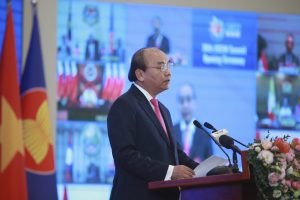When Vietnam’s Prime Minister Nguyen Xuan Phuc received the symbolic gavel from his Thai counterpart Prayut Chan-o-cha in the ASEAN chairmanship handover ceremony in November 2019 in Bangkok, he did not know what challenges his country would face just a few months later.
Vietnam, despite its success in fighting against the COVID-19 pandemic, has had an unprecedentedly difficult year as the ASEAN chair. The year’s theme was “Cohesive and Responsive ASEAN,” yet the chaos of the pandemic threatens to throw the country’s hopes away. Despite Hanoi’s lobbying for a traditional form of physical ASEAN meetings to be held in Da Nang in April, the event eventually took place via video conferencing for the first time since the founding of ASEAN in 1967. The new format challenged the host country’s ability to set the agenda and process important negotiations.
“ASEAN diplomacy is privately led; it is famously known for making major agreements on the golf courses, at the karaoke halls, and having drinks on sideline meetings… When you don’t have these actual in-person meetings… virtual events will dilute the ‘ASEAN way’ of doing thing and ASEAN will suffer for it,” a Bangkok-based, Southeast Asia-focused scholar noted earlier this year, expressing low expectations for Vietnam’s achievements during its ASEAN chairmanship.
However, while its neighbors are still struggling with the pandemic, Hanoi has been surprisingly creative in its diplomatic actions and made the best out of the situation, not only for itself but also for the ASEAN community. While its achievements are not all significant, Vietnam has proved that ASEAN might not completely mean every nation for itself.
Vietnam has deftly managed to shift typically offline diplomacy to online platforms. It organized all the important events in an ASEAN year, including the first virtual summit in June and the upcoming one this November (which is expected to also include face-to-face meetings for the first time in 2020). Taking a positive view, the online shift actually streamlines excessive meeting duties. Within the framework of the 53rd ASEAN Foreign Ministers’ Meeting and related meetings (AMM), up to 42 documents were adopted, a record in the history of AMMs.
The number of meetings and documents are not necessarily sufficient to evaluate the chair’s performance, particularly given ASEAN’s record of speaking more loudly than its performance of meaningful actions warrants. Yet a closer look at what actually has been done during this turbulent year also generates an appreciation of Vietnam’s efforts.

































